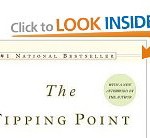Someone remarked to me the other day, I can’t remember who, that it must be tough being a fiction writer right now, what with all the other forms of entertainment competing for people’s attention. Why would anyone read a book when they can play video games or socialize on Facebook or whittle away their hours creating play lists on iTunes? On top of that you’ve got a recession, the struggling bookstores, the trouble landing an agent, and the probable collapse of the book distribution system.
When I replied that actually they’ve got it dead wrong, there’s never been a better time to be a fiction writer, that if I had a time traveling machine and could pick only one time to be a novelist, I’d pick now without question, I’m pretty sure he thought I was smoking something.
But it’s the truth. Seriously.
Don’t believe me? Here’s ten reasons why:
10. More People Are Buying Fiction Than Ever Before
I know this is goes against conventional wisdom, as well as what you usually hear in the media, but it’s the truth. Wait, wait, someone counters, book sales are down. Oh no, print book sales are down, and really only slightly. If you add up all the books being bought in both print and electronic form, you see that people are buying and reading more novels than ever– much of this due to the changing way people are consuming fiction. There’s been a number of studies that have confirmed this.
Yes, the major publishers are struggling to adapt to the changes in the marketplace, and for many of them sales are down, but that doesn’t mean that overall fewer books are being bought and read. It’s the exact opposite.
(For a fun, strangely addictive visual of books being bought in real time all over the world, check out this site from The Book Depositor.)
9. Traditional Publishers Are Alive and Well and Living in New York
After the doom and gloom of that last pargraph, you might think I’m down on traditional publishing — most of which is accounted for by the Big 6 — but that’s really not the case. My first novel was published by Simon and Schuster, and I just sold them another. Despite all the prognostications that these massive behemoths are going the way of the dodo, I just don’t see it happening. It’s a billion dollar industry chocked full of very smart folks who didn’t get into their positions by being idiots. Will some publishers go out of business? Sure. Will most? Doubt it. More likely they’ll go through some tremendous growing pains as they adapt.
some tremendous growing pains as they adapt.
And for a new writer, having a major publisher behind you is still, and may always be, the best way to build an audience — at least in the beginning, as Lee Goldberg writes over on his blog. Advance money, professional editing, copyediting, top notch covers, and the legitimacy and clout that comes from having lots of other people excited about your book, which is really what going with a major publisher is all about, are just a few of the benefits. There’s also something to be said for the boost in self-confidence you get when a major corporation that’s putting $100,000 or more on the line for your book tells you, yes, we think you’re ready for prime time.
Though publishers may be a little selective these days, skittish because of the faltering economy and other factors, they’re still buying lots of books from both established authors and new authors all the time. Don’t believe me? Go subscribe to PublishersMarketplace.com for a few months and you’ll get a good sampling of the deals that are being made on a daily basis.
8. Chain Bookstores Are About to Die a Horrible Death — and That’s a Good Thing
It’s ironic, isn’t it? The big bad chain stores put all the Ma and Pa independent stores out of business . . . only to go out of business themselves. Borders is on its last legs, and Barnes and Noble, though struggling mightily to adapt, is probably going the same way. (If one of the two survives, I predict it’ll be Barnes and Noble, but that will be because they’ll become a fairly close parallel to Amazon.com.)
I was never one who hated the chain stores with a passion — hey, I even owned an independent bookstore for a couple of years — but even so, I think this is a good thing for writers. With more readers buying books either by mail or electronically, those big bookstores with their even bigger real estate just can’t sustain all that overhead. I doubt we’ll ever go back to the days with thousands of little independent bookstores across the nation, but I do think you’ll see a resurgence of them, most of them built on the Powell’s model, mixing used books and new, with an added focus on antiquarian books (more and more, printed books will be collector’s items). Not all will need to be as big as Powell’s, but they’ll be unique, with the kind of hand selling, personalized service, and sense of community focus that will help writers more than those big chains ever did. And you’re already seeing the first signs of it happening.
And if not? Well, as much as I would mourn the loss of bookstores, it’s never been easy getting books into them, even if your book has the seal of approval of a major publisher. Without them, the playing field is even more even, with everyone buying from the same online story marketplace.
7. POD (Print on Demand) Has Created a Low Cost, Low Risk Way to Publish Books
If you haven’t heard of Print on Demand technology, basically it’s a book printer that only prints one book at a time. They’ve been around for years, allowing small publishers to print niche books without having to take the financial risk that comes with printing 10,000 books instead of one. The price-per-book is higher, of course, which usually amounts to higher retail prices, but it’s allowed thousands of books to be available to readers that couldn’t be available before. Why is this a good thing for fiction writers?
Not only can writers go through small independent publishers who use POD, as I did for my first collection, they can also do it themselves — at practically no cost. You can certainly hire someone to do it for you, but if you have a decent working knowledge of Microsoft Word as well as a graphic program that can create a decent cover, you can use Amazon’s CreateSpace to make a print book available to readers on Amazon.com for free. Or you can pay $39 and get a bigger royalty. If you want to make sure your book is available to every bookstore in the world — so when the clerk goes to look up your book on the computer, it appears — you can go with Ingram’s LightningSource for under $150. It will require some technical ability and a little learning, but if you’re willing to do it yourself, you can make $2-5 per book instead of the 50 cents you’re likely to get in royalties from a major publisher. (For those of you who aren’t writers, I know that seems hard to believe, but most authors get 6-10% of the retail price, with most of us on the lower end. Do the math.)
cost. You can certainly hire someone to do it for you, but if you have a decent working knowledge of Microsoft Word as well as a graphic program that can create a decent cover, you can use Amazon’s CreateSpace to make a print book available to readers on Amazon.com for free. Or you can pay $39 and get a bigger royalty. If you want to make sure your book is available to every bookstore in the world — so when the clerk goes to look up your book on the computer, it appears — you can go with Ingram’s LightningSource for under $150. It will require some technical ability and a little learning, but if you’re willing to do it yourself, you can make $2-5 per book instead of the 50 cents you’re likely to get in royalties from a major publisher. (For those of you who aren’t writers, I know that seems hard to believe, but most authors get 6-10% of the retail price, with most of us on the lower end. Do the math.)
So, with a little bit of knowledge and a fair amount of do-it-yourself attitude, you can make books available to every reader through almost every bookseller at very little cost. This is only part of the reason the rise of POD is a good thing for writers, which I’ll touch on in a moment.
6. The Internet Gives Writers a Way to Promote Themselves and Their Work at Practically No Cost
Consider this. If you have a library card, you can go down to just about any public library in America and create a free website, like I did for The First Book blog that I ran for about a year. (I like WordPress.com because not only does it allow you to create a blog, but you can have static pages too, so a fiction writer can have biography page, a bibliography, and more.) So for no cost at all you can have access to an audience of two billion people and growing. If you’re willing to pay around $10 annually, you can have your own domain name (like www.scottwilliamcarter.com) pointed at your website. If you’re willing to pay $6-7 a month, you can have a whole bunch of other services.  My own site was created by making some slight modifications to a free WordPress theme. Yes, I put a little time into the banner, but that’s optional.
My own site was created by making some slight modifications to a free WordPress theme. Yes, I put a little time into the banner, but that’s optional.
For this reason alone, there’s never been a better time to be a writer, fiction or otherwise. Think Shakespeare wouldn’t have killed to have access to the Internet? The World Wide Web is a true meritocracy, where given time and attention, quality writing rises to the top. You could be like this guy complaining about his girlfriend on a funky website and eventually land a major book deal.
This is all true so long as net neutrality remains in place, of course.
5. There’s Now an Infinite Number of Ways to Interact Directly with Readers
Twitter. Facebook. Youtube. Goodreads. Blogs. Forums. Linkedin. Myspace. The list of ways that writers can interact with both readers and other writers goes on and on. Of course, there’s the non-Internet world of conventions and conferences, too, but online social networking has provided writers a way to interact with others at no cost other than their time. A lot of people have used social networking to make professional contacts, raise their profile, and even establish what folks in the business call “a platform.” I have to add a caveat that I’m not a big believer in expending a lot of energy here (though I like to keep my toe in the water), not because I don’t think it’s worth it but because I believe we all have to make choices with our time — and a fiction writer’s time is better spent a) writing fiction, and b) getting better at writing fiction. Remember, quality rises to the top. No amount of Facebooking and Twittering will get people buy a book that’s poorly written.
non-Internet world of conventions and conferences, too, but online social networking has provided writers a way to interact with others at no cost other than their time. A lot of people have used social networking to make professional contacts, raise their profile, and even establish what folks in the business call “a platform.” I have to add a caveat that I’m not a big believer in expending a lot of energy here (though I like to keep my toe in the water), not because I don’t think it’s worth it but because I believe we all have to make choices with our time — and a fiction writer’s time is better spent a) writing fiction, and b) getting better at writing fiction. Remember, quality rises to the top. No amount of Facebooking and Twittering will get people buy a book that’s poorly written.
Still, no one can deny the power of social networking when the financial cost (pretty much zero) is added to the mix.
4. Learning the Craft and The Business Is Easier and Cheaper
Beyond reading some how-to books of varying quality, it used to be that writers had to travel thousands of miles to professional conferences and workshops to glean those precious few gems of knowledge about the craft and business of being a professional writer. If you’re lucky, you ended up in a city with a group of like-minded professional writers who met on a regular basis.
But today, you can follow the blogs and websites of dozens of different writers and gain the same knowledge. (Or at least a good chunk of it — it’s still worth it to go to the occasional conference or workshop). Want a list? If you’re starting out, read these folks regularly: Kristine Kathryn Rusch, Dean Wesley Smith, Michael Stackpole, John Scalzi, Lee Goldberg, and J.A. Konrath. From there, you’ll end up finding out about others, but these are all fiction writers doing great things, all of them doing their best to keep up with current trends, all of them willing to share their hard-earned knowledge and experience. Since there’s an overwhelming amount of advice out there, much of it conflicting, my recommendation is this: pay attention to writers who have walked the path you want to walk. It doesn’t mean that other people don’t have knowledge to share, but you can’t read everyone, and this is a good rule to help focus your attention.
knowledge. (Or at least a good chunk of it — it’s still worth it to go to the occasional conference or workshop). Want a list? If you’re starting out, read these folks regularly: Kristine Kathryn Rusch, Dean Wesley Smith, Michael Stackpole, John Scalzi, Lee Goldberg, and J.A. Konrath. From there, you’ll end up finding out about others, but these are all fiction writers doing great things, all of them doing their best to keep up with current trends, all of them willing to share their hard-earned knowledge and experience. Since there’s an overwhelming amount of advice out there, much of it conflicting, my recommendation is this: pay attention to writers who have walked the path you want to walk. It doesn’t mean that other people don’t have knowledge to share, but you can’t read everyone, and this is a good rule to help focus your attention.
I can’t tell you what an amazing treasure trove of information this is, information that writers twenty years ago had to pay for dearly in both time and money.
3. The Rapid Rise of E-Readers, like the Kindle, Are Creating Incredible Opportunities
After twenty years of just percolating along at 1% or less of the books sold, electronic books have finally hit the tipping point. Many analysts say that ebooks already account for about 10% of the market, a dramatic rise in the past two years, with it expected to be upwards of 50% by 2015. Although Amazon is not very forthcoming in their Kindle sales, many experts think the number sold is around 4 million and counting.

Why is this a good thing for the fiction writer?
Because you now have access to a huge story marketplace at zero start-up cost. You can create an account for free on Amazon’s Digital Marketplace and sell your work to millions of Kindle owners. You can create a free account at Smashwords.com and get that same novel or short story into lots of other venues, including Barnes and Noble, iBooks, and the Sony e-store. Not only that, but you can get a royalty rate in the range of 35% to 70% depending on the venue and price point.
Let me repeat what I said before: There’s no start-up cost.
You just need to spend a little time and effort putting your work into the proper format. I’m already putting up all of my published short stories, and it won’t be long before I’m putting up original work too. I think you’ll see most fiction writers working with major publishers as well as doing it themselves (including POD), either with their own company or small nimble publishers and co-ops.
I’m not saying that every writer should jump out there and make any old thing available — there is a benefit to practicing, honing your craft, and waiting for the right time — but if you believe in your work, think you’re ready, and can’t jump over The Great Wall of Publishing that separates your work from readers, then you now have the ability to make that work available and see what happens.
And sometimes amazing things happen. Read Amanda Hocking’s story for a great example of someone who went from unpublished to making $9000 a month in a matter of months.
2. The End of Out of Print
Especially for the prolific fiction writer, this development is gold — the end of “out of print” as we know it. With the developments mentioned above, no writer needs to let their backlist languish in obscurity. The novel you write today will be available now and as long as you wish it to be. This will be true of the books you publish with others (major publishers are going to make it tougher and tougher for you to get your rights back, because they see the same playing field you do) as well as the ones you publish yourself.
The power of the math here is staggering. Let’s say you have an ebook on Amazon that averages one sale a day — one you published yourself. That’s it. One sale. If it’s priced at $2.99, it nets you $2 for every sale. In thirty days, that’s $60. In a year, it’s $720. In ten years, it’s $7200, which is what many writers earn as a starting level advance. Don’t think that’s much? What about ten books? What if you sell ten copies a day? Don’t think it’s possible? Well, for poorly written books it generally isn’t, but it’s happening for a number of writers right now.
A writer’s backlist can keep earning and earning and earning . . .
1. Why It’s Still All About the Writing, or How Sampling Will Allow Great Writing to Rise to the Top
There’s a lot of aspiring writers who will read everything I’ve said and make the mistake of thinking there’s easy money to be made right now writing fiction. Just toss any old thing with vampires in it online and people will buy it. There may even be a tiny bit of truth to it, if only for books priced very cheaply (.99 cents, for example).
However, that won’t last forever. Eventually there will be such an overwhelming amount of mediocre fiction available that it will be tough for any single mediocre work to generate even modest sales. On top of that, I fully expect more publishers will get their ebook prices down to a level more consumers are willing to pay — in the $2.99 – $5.99 range.
But here’s the thing. Because sampling — the ability customers have to sample a work of fiction before buying it — has become so easy and such a standard part of the online book shopping experience, great writing will always stand out. For the serious fiction writer, one who’s dedicated to always getting better, this is a godsend. There are those who claim that because there will be so much dreck on there, even good stuff will be lost in the noise, but I don’t buy it.
a work of fiction before buying it — has become so easy and such a standard part of the online book shopping experience, great writing will always stand out. For the serious fiction writer, one who’s dedicated to always getting better, this is a godsend. There are those who claim that because there will be so much dreck on there, even good stuff will be lost in the noise, but I don’t buy it.
You see, a decade or so ago the music industry underwent the same sorts of changes that the publishing industry is going through now. There’s now more indie bands out there than ever, and more ways for those indie bands — bands not signed with a major record label — to reach potential fans. Because customers can sample songs before buying them, great music is more likely than ever to get bought.
Then it gets tweeted on Twitter. Liked on Facebook. Reviewed on a blog. And the power of the Internet to make sure great music is noticed and appreciated is fully at work.
Now the same is true for books. And it’s the number one reason why it’s a great time to be a fiction writer, especially one who’s dedicated to continually getting better as a storyteller.
